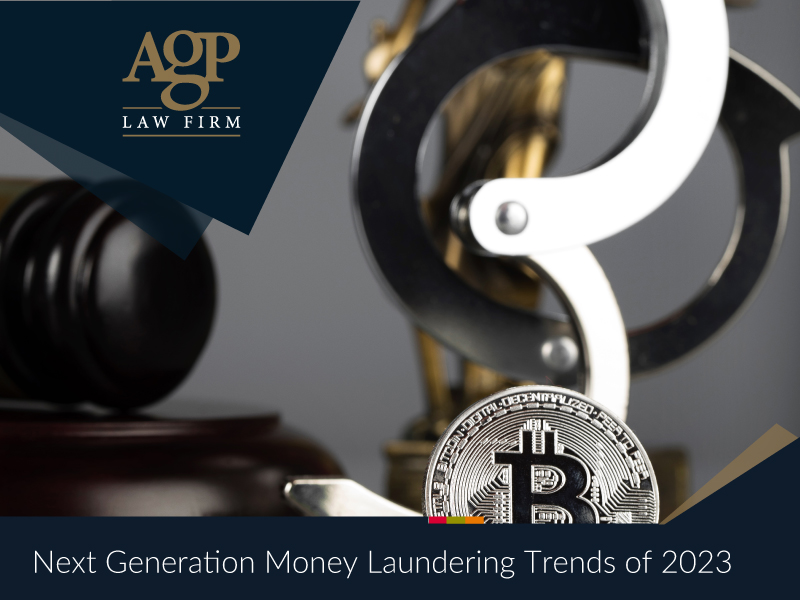Next Generation Money Laundering Trends of 2023

By: A.G. Paphitis & Co Law Firm
There is this relatively recent term “RegTech” which is extraordinary and it fits the elaboration on the following matter:
“A RegTech assists a bank, credit union, or other financial institution by using technological advancements in data mining, artificial intelligence, blockchain, Machine Learning, automation and so forth to solve problems, optimize processes and manage risks for regulatory compliance”.
The last decade of the technological advancement in AML has been hectic: Software can track / monitor transactions and periodically provide their clients with solutions exceeding all imagination:
- Keep documents in one place;
- Determine the risk-based approach alongside with daily flow;
- Ensure regulators remain satisfied with the audit trails and ‘timelines to tell a story’; and
- Monitor their transactions; their identity; their wealth and eventually their day to day legal or other requests.
The regulators may also use the technology in their favor, and being capable of performing relevant searches, following closer entities’ transactions and scrutinizing the behavior if unacceptable or otherwise.
Another ML trending area is to convert crypto into fiat (traditional cash money):
For cryptocurrencies refers to the laws, rules, policies to prevent criminals from turning unlawfully obtained cryptocurrency into fiat.
The reason for which offenders prefer this trend, is that it provides “a high degree of anonymity”:
“Cryptocurrency transactions allow greater anonymity than traditional non-cash payment methods. Users can trade virtual currency on the internet and transactions are generally characterized by non-face-to-face customer relationships, permitting anonymous funding (cash funding or third-party funding through virtual exchangers that do not adequately identify the funding source)”.
As a result, the launderers needed to find different methods to proceed with their respective activities. Also, the utilization of ‘smurfs ’ is common in order to cash-out the money for them, with an agreed interest. For example in the Republic of Cyprus a smurf1 is anything less than 15,000 Euros.
There used to be more laws on UBOs transparency. This is dubious though since the passing of laws to reveal the UBOs identity, at least to register their names in a specified directory. The access to the directory especially in the Republic of Cyprus was recently denied to the public and went back to normal i.e. you need to have a legitimate interest, or a court-order or a police investigations processes. Otherwise, if one doesn’t establish a genuine interest to find-out the said information, then access will be denied.
It is very complicated to strike a balance between what is General Data Protection Regulation and the public interest. The second one prevails when there is a legitimate authority asking for the revealing of such data.
It has become the modern norm that the more complex and opaque structures are, the higher the level of possibilities that the client is not transparent enough. Here it is very similar to the privilege to remain silent in the criminal proceedings. The more the client cooperates the less doubts remain on the bargaining table.
The main difference between an accused person to remain silent during investigations and the client to cooperate less, is that only the first one can have this option.
EU laws especially the 5th and 6th EU Directive on Money Laundering promote enhanced due diligence procedures when:
- There is a Politically Exposed Person (PEP);
- There is a connection with a Politically Exposed Person;
- Governmental and ex-governmental officers are involved;
- High risk businesses such as money transferring services are involved and so forth.
Once a person or entity has classified as being “High-Risk”, the above-mentioned laws specifically demand from the provider to collect:
- More identification documents and especially Apostille under the relevant Convention;
- Clean criminal records from the country of origin;
- The source of accumulated wealth and the source of funds;
- An updated and recent Curriculum Vitae;
- Recommendation Letters from lawyers or auditors knowing them more than five years; and
- If it is a corporate entity, many years of financial statements to show real activities and especially real incentive to cooperate with governmental authorities; tax authorities; judicial authorities; chambers of commerce; and other related business ethics.
When eventually the provider collects all the pre-mentioned data, the client’s profile is created. This profile at our modern conditions, will act as a point of reference when there is trouble. For example, someone not being the person he/she said they are. Or when money-transfers come from another source or name other than the UBO’s name. There are countless examples in the AML typologies, and the launderers are very into improvising new techniques to continue their businesses unobstructed.
For all of your business and legal enquiries please contact us directly at agp@agplaw.com
The information provided by A.G. Paphitis & Co. LLC is for general informational purposes only and should not be construed as professional or formal legal advice. You should not act or refrain from acting based on any information provided above without obtaining legal or other professional advice.
References:
1 A smurf is a colloquial word for a money launderer who attempts to avoid regulatory inspection by dividing major transactions into a series of smaller transactions that each fall below the reporting brink. Smurfing is a criminal offense with significant repercussions. (Courtesy of the webpage: Sanctions Scanner)



